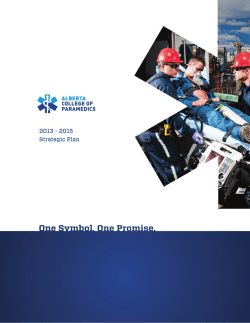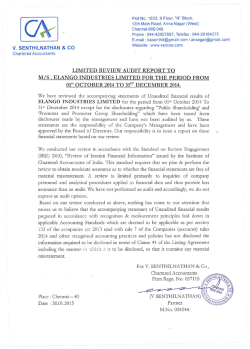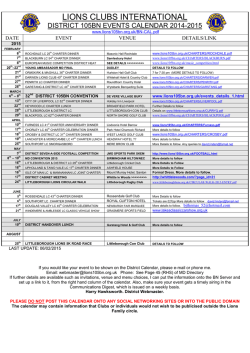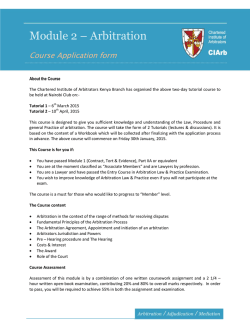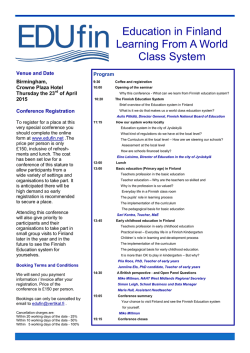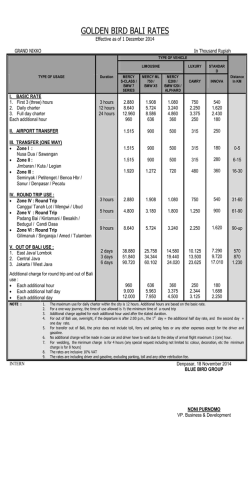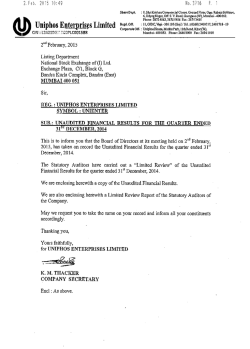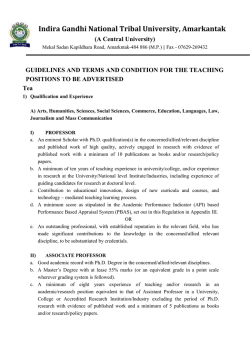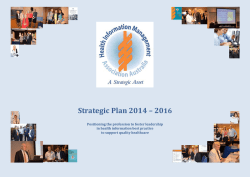
proposal released today
Embargoed until 00.01 2 February 2015 The profession’s new College of Teaching: A proposal for start-up support Contents Support for this vision from the education community..........................................................3 0 Executive summary...........................................................................................................4 1 Introduction........................................................................................................................8 2 Continuing to improve standards of teachers and teaching..............................................9 3 The functions of a College of Teaching...........................................................................10 4 Benefits of membership...................................................................................................14 5 The implementation plan.................................................................................................15 Appendix 1: Organisational and individual support............................................................20 Appendix 2: The Claim Your College coalition....................................................................22 Appendix 3: Royal Charter.................................................................................................23 Appendix 4: The Founding College mobilisation plan........................................................24 Appendix 5: Articles from teachers and supporters............................................................25 2 Support for this vision from the education community The new College will be committed to improving the education of children and young people by supporting teachers’ development and recognising excellence in teaching. It will be led by teachers, enabling the teaching profession to take responsibility for its professional destiny, set its own aspirational standards and help teachers to challenge themselves to be ever better for those they serve. It will be an autonomous, voluntary body, independent of government but working alongside and complementing it. It will also be independent of unions and will not seek to represent teachers on matters such as pay and conditions. It will have parity with other chartered professional associations, enhancing the status of teaching. Its Charter will also provide full independence from government. Through voluntary association and membership that is available to all teachers but forced upon none, the College will demonstrate a deep commitment to high professional standards, continuing professional development and evidence-informed practice. Through a mobilisation and a three year incubation period to pilot and develop the College’s activities, the proposal provides the opportunity for all those interested in being part of the College to shape its future. Serving teachers will be in key governance positions, supported by ongoing consultations with the wider profession and the College’s growing membership. The new organisation will need time to establish secure standards. However, in the longer term, we envisage that the Government’s role in publishing Teacher Standards will become redundant. The promise of support from government and other funders is welcome on the understanding that the independence of the College cannot be compromised. We believe we have the opportunity to create something lasting, with the potential to change the culture of teacher development for the better. Those listed (Appendix 1) broadly support the vision to create a new College of Teaching as expressed in the proposal, and understand that this ‘Claim Your College’ document has outlined a plan at a point in time and that this will develop as we consult further with teachers. Moving forward, a live list of supporters will be available on the Claim Your College website at www.claimyourcollege.org/supporters/ 3 0 Executive summary 0.1 Background This proposal sets out the Claim Your College campaign’s intentions and next steps and a plan for the founding of a new chartered College of Teaching. It is the culmination of more than two years of work involving widespread consultation across the profession; this resulted in a refinement of the operational model and guiding principles published in February 2014 by the Prince’s Teaching Institute in their blueprint for a member-driven College of Teaching. The consultation has secured a broad supporter base for the current proposal (as set out in Appendix A). Since October 2014, consultation has been conducted under the banner of the Claim Your College coalition, initiated by the existing College of Teachers, the Prince’s Teaching Institute, the Teacher Development Trust and the SSAT. These organisations have acted as enthusiastic advocates for a new College and contributed considerable staff time and resource to the campaign. The objective, however, has always been and remains to establish a process that will result in a member-driven professional body for teaching, which supports teachers to provide the best possible outcomes for learners. This document acts as a response from the Claim Your College campaign to the Department for Education’s (DfE) call for expressions of interest within the consultation document A World-Class Teaching Profession: Government Consultation published on 9th December 2014. This is a plan and will be developed through continuous consultation with the profession. 0.2 The vision We believe that the establishment of the new College of Teaching will ensure the profession is given the status, aspiration and professional pathways recognised by chartered bodies in other professions. Teachers will work in their early years towards a higher professional standard (the equivalent of ‘chartered’ or ‘fellow’ status), which will demand rigorous, ongoing professional development and create expectations on employers and new entrants which will match those in other professions. It is essential that the profession creates a platform and structure for career‑long, continuous professional growth of the capacities, impact and recognition of the individual practitioner. In many other professions, a chartered professional body sets standards for entry to the profession, requirements for professional conduct and practice and expectations of ongoing professional learning and development. These functions are carried out involving leading members of the profession, drawing on the best evidence available. 4 Critically – and again, without exception – these professional bodies set expectations for the early period of professional formation, which require new entrants to the profession to undergo an extended period of initial development (mostly on the job, but with periodic, well-judged off-the-job interventions) that is longer, more comprehensive and more rigorous than is currently offered to teachers. We believe that the lack of such a body in teaching is a major institutional weakness and that addressing it will enable a significant improvement to the education system. Set up under license of a Royal Charter, the new College will be able to pursue its purpose effectively, in perpetuity, ensuring a status and continuity that we believe to be important in giving teaching the same status as other professions. A Charter also guarantees the College’s continued existence and independence from government and politics in a way that no other legal structure could, providing a mooring that is flexible and responsive to ensure its future effectiveness. The new College of Teaching will have serving teachers in key governance positions – they will never be in the minority in governance structures. At the point at which the Charter passes to the new College of Teaching, the College of Teachers will cease. There is widespread agreement that a College of Teaching must be: • Independent. • Voluntary. • Run by teachers for the ultimate benefit of learners. • Subject to a governance model that ensures no single interest group can dominate. The College will not: • Regulate. • Be compulsory. • Have a disciplinary role. • Be a commercial organisation - any surpluses will be reinvested towards teachers’ continued professional development. The College will benefit members by offering: •P rofessional standards. Members will be accredited against valid, portable, respected, sector-led standards; these will provide opportunities for career development, confer status and inspire respect. • Professional development. The College will provide a career pathway that informs access to high-quality professional development and learning, and enables its members to build a validated portfolio documenting professional impact supported by a College Mentor. • Professional knowledge. The College will provide access to a quality-assured and diverse professional knowledge base, drawing from academic research and teachers’ judgements of the best ways to help children succeed in specific contexts. • Recognition by schools. Organisational affiliation will demonstrate a school’s commitment to providing access to professional learning and accreditation, including peer-to-peer review. 5 • A common code of practice that reflects aspirational standards of teaching, an evidenceinformed approach to practice, ethical behaviour, promotion of the profession and the best possible opportunities for learners. 0.3 Funding and timescale As a membership organisation a new College will ultimately be funded by its members, however there are significant start-up costs that require external support. An incubation period of development and rigorous evaluation is important. We intend that during the incubation period there will be a significant engagement of teachers all over the country, with the intention of raising expectations as well as building ownership of standards among teachers. During the first five years, we intend to have secured the engagement of school leaders and established professionals and new teachers in ways that begin the process of significantly changing the culture of the profession. Proposed detailed costings have been developed alongside an initial implementation plan. We recognise that these may change once appropriate boards and personnel are recruited and it would be essential to continually review. We have looked at a cost-effective model of accreditation and validation and estimate a membership of 50,000 by the end of year four, with an average membership fee of £70 per annum, at which point the full chartered membership scheme will launch. The model assumes approximately 20% of teachers are chartered by year 10 to create a self-sustaining financial model. In the first five years the model requires £11.9 million of seed funding. To implement this proposal, a College of Teaching Ltd – a company limited by guarantee currently seeking charitable status – has been registered. This will be the vehicle for establishment of the new chartered College of Teaching as set out in this proposal. The company is currently negotiating support from a range of charitable and philanthropic sources and will launch a crowd-funding platform to recruit founding members. Claim Your College has campaigned for a mix of charitable and philanthropic funding as well as public investment to subsidise membership income for the first phase of the College. Any external contributions must be made on the clear understanding that the resulting organisation is entirely independent. 0.4 The role of government We welcome the interest of government in this work and the recognition that it is vital the new College is genuinely independent of government, as well as of all other interested parties. However, we recognise that a new College could not be successful in establishing itself in its early years if its existence did not have in principle support from government. Nonetheless, we believe that the process to establish the new College could only accept money from the Government if it was clear that: • The money was provided on a ‘fire and forget’ basis. • The conditions of the grant were set transparently and publicly at the time of the grant and did 6 not unduly fetter the discretion of the trustees as to the use of the resources in the service of establishing a College in line with the vision described above. • The provision of resources was not a matter of party political controversy and commanded consent among the major political parties. The College will not be a government agency. We understand that this is in line with the Government’s intentions and welcome this. In this document, we set out a well-designed process to establish the College and to ensure that no single interest group or government could dominate. 7 1. Introduction 1.1 This paper is a response to the DfE call for expressions of interest in setting up a College of Teaching, published in ‘A World-Class Teaching Profession: Government consultation’ (9th December 2014). 1.2 The model proposed here is the result of extensive consultation across the profession with individual teachers and headteachers and the range of professional associations that represent their interests including – Trade Unions, membership organisations and learned societies. The essential elements that have universal agreement are that a College of Teaching must be: • Independent. • Voluntary. • Guided and informed by a diverse and robust professional knowledge base. • Run by teachers for the ultimate benefit of learners. • Subject to a governance model that ensures no single interest group can dominate. • Trusted to act as an informed voice to represent the profession in debates on policy and practice. 1.3 The plans presented here for the services, processes and governance of the new College of Teaching will achieve these aspirations. While the exact detail of implementation must be a matter for the College membership once established, the proposal here offers a route to a chartered body with the capacity to create a professional career structure and support for classroom teachers comparable to those found in other mature professions. 8 2. Continuing to improve standards of teachers and teaching 2.1 An independent professional body provides a professional ‘mooring’ for practitioners at all levels that is, importantly, external to their workplace. Such chartered membership organisations are well established in other professions such as medicine, law and engineering. They establish high standards of practice and hold their members accountable for achieving and maintaining these standards in order to earn and retain individual chartered status. It is through such activity that these Colleges and Institutions have established and retain the trust of the public and policymakers in their professional practice. The College of Teaching will fulfil this role for the teaching profession. 2.2 The school improvement policies of recent decades have depended on a platform of strategies: a focus on the autonomous school as the unit that succeeds or fails; increasingly sophisticated student assessment data as the basis for target setting both for students and teachers; and the development of a range of interventions to improve outcomes. These approaches have relied upon position-power and strong line-management by school leaders and external accountability through inspection. All of these approaches remain important and no-one should be suggesting ‘taking the foot off the accelerator’ in any of these respects. 2.3 Rethinking professionalisation adds a new, different, complementary and, in our view, essential platform of strategies. Centrally, it adds a separate and different focus on the career-long continuous professional growth of the capacities, impact and recognition of the individual practitioner. In other fields, ‘the profession’ describes a cadre of individuals whom the public can trust to perform to recognised standards, regardless of where and by whom they are employed. Developing new understandings about professional practice is essential to enabling teaching to make significant progress as a research-informed profession. 2.4 The College of Teaching will set out, recognise and accredit standards of professional practice in a framework that describes a career development pathway for teachers typically in the first five to 10 years of full-time employment in teaching. These standards will be developed from the ground up and be evidence informed, rigorous and aspirational. Validated achievement of these standards will qualify teachers for chartered status and potentially fellowship of the College of Teaching. 2.5 Over time, these standards will become recognised, as in other professions, as indicators of excellence. Working towards the achievement of these standards will be a formative process to develop practice, support teachers in their professional maturation and ultimately contribute to securing the best possible outcomes for learners. This framework will offer a pathway that recognises, rewards and incentivises classroom-based roles as a route to career progression. 9 3. The functions of a College of Teaching 3.1 Standards and membership 3.1.1 Establishing, in perpetuity, an independent College of Teaching recognises the long-term and evolutionary nature of continuous improvement in professional practice, keeping pace with new research and with society’s changing expectations. It is essential that the new College is set up in a way that enables it to pursue its purposes effectively for many decades to come. Those working to bring it into being must concentrate on the time-limited task of managing a smooth transition process and must resist the temptation to fetter the discretion of the new College by taking binding decisions for the long term that should properly be taken by the new organisation in accordance with its constitution. 3.1.2 It is also necessary that the new College is established within existing law. Some years into the future, when the new College has gained the respect and confidence of the public, it may be a natural development to transfer some functional aspects from government to the profession, but that would be a matter for discussion between future governments and future leaders of the profession. 3.1.3 The work to develop interim standards for chartered and fellowship status will take into account examples of current and emerging practice from Britain and around the world. These could include: the current Teachers’ Standards; the standards governing chartered subject teacher status; other existing professional recognition programmes such as the National College’s National Professional Qualifications; the SSAT’s Lead Practitioner; emerging good practice from around the world; the work already undertaken by Claim Your College; the EU-funded PEEP (Policy for Educator Evidence in Portfolios) project, which developed a policy on portfolios for educator development. 3.1.4 It is important that the model acknowledges the existing breadth and depth in how teaching expertise is currently evidenced; looking beyond qualifications and standards to include online portfolios, and valuing experiences and tangible contributions to the profession. Implementing the standards - developing the processes for teachers to accumulate evidence and the assessment and accreditation of this for chartered status - will involve the training and supervision of practitioner assessors, quality assurance and moderation systems and IT and communications infrastructures. The pace of progression towards the participation of the whole workforce will be largely determined by the pace at which the cadre of assessors can be developed and deployed. 3.1.5 The exact formulation for membership requirements and grades will be developed by the new College. Membership must be grown as quickly as possible. Membership will be open to all with an interest in education but chartered membership status will, in the first instance, be developed for and only available to practising classroom teachers. In setting up a new College, care will be taken to ensure that in the future it would be possible to develop further chartered routes, such as Chartered Teaching Assistant or Chartered Examination Officer – but this will be a matter for the College. Fellowship will denote a deeper level of professional practice. 10 3.1.6 The standards for all levels of membership will be set by the College and the final decision on admission to the College at each level will sit with the professional standards board of the College. The standards will be public and available for any CPD provider to use, including universities. There is an expectation that higher degrees in education will, over time, mesh with, complement and partially satisfy the criteria for Fellow and potentially Doctoral Fellow, should the latter be adopted. 3.1.7 The essence of professionalisation is that individual practitioners take responsibility for managing their professional growth throughout their whole career and voluntarily put themselves forward for further progression at the appropriate times. This contrasts with models involving compulsory mass registration, which are incompatible with professionalisation and which have been found costly and ineffective in the UK and in other countries. The most appropriate path to universalisation is the gradual spread of employers’ expectations that candidates for employment will have achieved professional recognition. To that end, the College will also offer institutional membership for schools or trusts that commit to the vision and ethos of the College and sign up to the code of conduct. 3.1.8 Staff of institutional members will enjoy significantly reduced costs for individual membership. The College would actively promote such institutional membership as this will accelerate the culture change we seek, whereby membership of the College, and in particular the achievement of chartered status, becomes an expectation within the profession. It would also involve schools making commitments about access to professional development and support for career development and ensure that workload is managed to allow these to take place – something that leading schools are already doing. 3.1.9 Chartered status must become an achievement that headteachers and employers value and come to regard as a normal expectation of those seeking promotion or employment. They will see it as a vital pillar of their CPD strategy and support staff in the practice of their membership. 11 3.2 Continuing professional development 3.2.1 The new College will provide a community of professional practice where members can make contacts, exchange information and share ideas. The professional community will offer opportunities for mentoring and peer support. This activity will happen in a moderated space where members can be confident that the outcomes of their professional interactions are subject to peer review from within the membership. 3.2.2 Teaching is a lonely profession in many ways and some classroom teachers currently rely on, for example, Twitter for pointers on useful information, as the Shepherd ‘How to acheive more effective public services’ report highlighted in 2014. The new College will give the reassurance that advice accessed is evidence-informed and politically neutral, and that an increasing proportion of the relevant evidence is generated within, or in partnership with, the profession. The existence of the new College will have the potential to move both the internal culture and external public perceptions of teaching closer to those of the mature professions while helping to prevent the waves of teaching fads to which the profession has been subjected. 3.2.3 The range of external training offered to the education community is wide and the quality variable. This is also reflected within schools, where the processes for professional learning and development vary wildly from superficial to world-class. The community that the membership represents should be in a position to offer advice and comment. Accreditation of external CPD providers and consultants is an option for a future College and could be a further source of both quality assurance and income. 3.3 Relationship to other membership organisations 3.3.1 The new College must not present a threat to other professional organisations that are providing value to education and command significant loyalty from their members. The process of achieving chartered status should recognise, not replace, experience and expertise gathered elsewhere, e.g. through subject associations or learned societies. In particular, it should recognise and offer credit for chartered status in a related membership organisation. As an example, we see the College process as adding value to the possession of specialist subject chartered status through wider recognition and understanding of their worth. 3.3.2 Similarly, the new College will not compete with Union membership: it will not represent individuals or have a role in negotiation of pay and conditions and its primary mission will be the ultimate benefit of children and young people. 3.3.3 The new College will offer value to other membership organisations and look to hold a category of association that offers joint benefits and reduced fees for individuals who hold joint memberships, in recognition of the financial pressures on teachers. 12 3.4 Evidence-informed practice 3.4.1 The promotion of research, critical evaluation and the use of evidence to inform practice will be at the heart of the ethos of the College. An understanding of this, and the evaluation of personal practice, will be critical to the achievement of chartered status. Qualification for chartered membership will include evidence of the professional skills of self-reflection, application of sound evidence within teaching practice, design of interventions and evaluation of their outcomes for learners. 3.4.2 The College will work in partnership to offer a signposting service to robust research and evidence of effective practice, not least from members. The model will draw on the ‘What Works’ approach used widely in research synthesis related to professional practice, always cautiously clear on the strength of evidence and avoiding damaging over-claiming or over-certainty. It will strive carefully to avoid indulging in the promotion of any particular ideology both through balanced and sober reflection on evidence and balance all the way through its governance structures. 3.4.3 Development work, including evaluation studies, would form part of the work of the College at least in regard to its own processes and practices. The work of the College to establish standards, protocols for accreditation and career pathways should all be subject to regular evaluation and review. Initially we do not see the instigation or practice of primary research as a role for the College. It would instead form strong relationships with existing respected research bodies such as the Education Endowment Foundation (EEF) and leading universities. However in future the College could offer support to members wishing to carry out research to inform their own practice and share outcomes to encourage professional dialogue, while remaining cautious about the very limited generalisability of this scale of study. 3.4.4 The ultimate aim for the College is to present evidence so that practitioners can make professional judgements about the practice that is most likely to work for their pupils, while accessing balanced analysis in a timely and relevant way. It is not to come up with rules and straitjackets for practice that must be applied unquestioningly based on the decisions of remote experts. 13 4. Benefits of membership 4.1 The benefits of the College for teachers will be: • Professional standards. Members will be accredited against valid, portable, respected, sector-led standards; these will provide opportunities for career development, confer status and inspire respect. • Professional development. The College will provide a career pathway that informs access to high-quality professional development and learning and enables its members to build a validated portfolio documenting professional impact and to be supported by a College Mentor. • Professional knowledge. The College will provide access to a quality assured and diverse professional knowledge base, drawing from academic research and teachers’ judgements of the best ways to help children succeed in specific contexts. • Recognition by schools. Organisational affiliation will demonstrate a school’s commitment to providing access to professional learning and accreditation, including peer-to-peer review. • A common code of practice that reflects aspirational standards of teaching, an evidenceinformed approach to practice, ethical behaviour, promotion of the profession and the best possible opportunities for learners. Professional Development Professional Knowledge Professional Standards Recognised by Schools Better access to high‑quality professional development and learning Pooling knowledge of the best way to help pupils succeed Respected standards with validity and portability Schools committing to access to professional learning and accreditation A respected portfolio to show professional impact Drawing upon academic research and making this available to professionals Accreditation against sector-led standards Schools committing to sector-led standards, peer-to-peer review Guidance from a College Mentor Contributing to a growing knowledge base to help all professionals Career development opportunities 14 4.2 The business plan assumes that the College will undertake work led by teachers that will make it valuable and accessible from the beginning. This could involve: • Organising a series of regional events with key partners, enabling teachers to discuss and share ideas with input from thought leaders. It would be supported by webinars and podcasts. • Recognising existing teaching excellence and commitment from the outset through a series of awards that would recognise teachers who make an outstanding contribution to the profession and improve the education of children and young people. • Producing a series of journals and publications. These would raise the College’s prestige and profile by reporting on its progress; add value to the profession by publishing articles by leading practitioners and experts; and contain pieces on evidence-informed practice, providing a springboard for debate at regional events. • Evolving a portal of CPD providers based on a ‘TripAdvisor’ model. This may be developed in future years, to accredit courses in terms of their effectiveness in changing practice. 5. The implementation plan 5.1 The Founding Company 5.1.1 A new charitable entity, limited by guarantee, is being formed to drive establishment of the College. This organisation will be the legal entity to host and deploy any start-up funding. The company will develop the new College’s constitution through an inclusive, consultative process that generates a sense of ownership by the profession, with no special interest group in the majority. It is envisaged that the College’s structures will be revisited as the Charter is negotiated. 5.1.2 The Founding Company will have 14 Founding Directors. These will be appointed through a transparent, public selection process and will be recruited on a skills and competency basis. There will be seven Teacher Directors. Five will be practising teachers, two will be headteachers with classroom experience. They will be representative of the profession with regards to phase, sector, gender, location, etc. 5.1.3 There will also be up to six Lay Directors, appointed according to their skills and reputation in the following areas: legal; financial; project management; communications; research and evidencebased practice; running a membership organisation. A seventh Lay Director will be a representative from The College of Teachers as required in petitioning for a renewed Royal Charter. 5.1.4 The process to appoint the Founding Directors will be managed by a recruitment company and a Selection Committee will select candidates. The Selection Committee will comprise six practising teachers and headteachers nominated by six of the main Unions: four practising teachers and headteachers nominated by organisations who have initiated the Claim Your College campaign; and six representatives from other key stakeholder groups (three heads nominated by the Local Government Association, the Independent Schools Commission and the Commission of Academy 15 Principals, and three Teacher Governors nominated by the National Governors’ Association). All teachers will have full delegated authority to act as individuals in this process. They will be representative of the profession with regards to phase, sector, gender, location, etc. These Founding Directors will become the first Trustees. Founding Phase Set up a legal entity (College of Teaching Ltd) and establish Selection Committee that represents the wider profession. Selection Committee appoints seven teachers and seven others (including one from College of Teachers) as directors – this establishes the interim Project Board. Project Board appoint Project Manager and other key staff. Sign up Founding Members who are consulted on Charter Workstreams. 5.1.5 The Founding Company’s principal activities will be to: • Engage the wider profession through a series of events and online discussions. • Manage communications. This involves increasing awareness among teachers – by leading the Claim Your College campaign and managing social media – and ensuring communications between Founding Supporters. • Raise funds. It will use crowd funding to sign up Founding Members and attract philanthropic interest for the College’s incubator and early launch phases. • Oversee consultations with Founding Members on the three Charter Workstreams: 1. Defining the new College’s constitution, having regard to practice in other UK professions and other bodies setting teaching standards worldwide; 2. Defining the high-level requirements for membership that are comparable with other chartered professions (e.g. requirement to demonstrate commitment to professional development); 3. Refining the structure of membership grades and levels of recognition. • Work with the existing College of Teachers to petition the Privy Council for a revised Royal Charter. • Set up operations, including accounting systems, information compliance, etc. 5.1.6 This work is expected to last until September 2015 and we anticipate that it will cost £500,000. It is anticipated this will be raised through crowd funding and philanthropic sources. 16 5.2. Incubation 5.2.1 The incubation period creates an opportunity to recognise the areas in which the current evidence base is fragile. Based on global experience – notably, the US and Australia – there needs to be an incubation period to draft, test and re-evaluate standards, establish criteria for appropriate professional development and to develop the research curation and dissemination function. We need to know about the types of smaller-scale research that are genuinely worth conducting and the support that needs to be provided to schools to engage with research and evidence more broadly. Models to achieve this will be tested and refined through the incubation phase. 5.2.2 It is hoped that this three-year incubation period will begin in Autumn 2015. 5.2.3 The financial plan assumes that the College would recruit a series of standard-setting working groups to form the basis of the piloting community and pilot the training of mentors and assessors. It is anticipated that teachers will form a minimum of 60% of each group, including members of the Subject Associations and other key professional teaching organisations and that these sub-committees will focus on specific subject areas and specialisms, e.g. SEN. Their main areas of work would be: • Establishing the professional standards required for membership by mapping existing accreditation and standards; designing the new standards as required (e.g. defining the levels in different professional areas, such as subject content knowledge, pedagogical knowledge, professional skills, contribution to the profession and leadership); and establishing appropriate assessment methods. These will be tested with pilot schools and teachers. • Establishing requirements for members to demonstrate competency in professional practice, and devising systems to record, accredit and process them, e.g. e-portfolios. • Training teachers to assess and mentor. A peer-mentoring network is one of the core ways that the College is intended to add value to the education sector. Collaborative online networks will grow to become part of the College’s fabric. • Developing, in partnership, a system to recognise and signpost effective, appropriate professional development. • Developing expertise and systems to identify effective teaching practice, whether in academic research or amongst the College’s membership network, by forming partnerships with world leaders in the field and developing an online research dissemination and interpretation portal. 5.2.4 This work will require extensive consultation with existing bodies to ensure the new College complements organisations already providing value to education. The achievement of chartered status should recognise, not replace, expertise gathered elsewhere. 17 5.2.5 Incubation will be overseen by the College’s first Executive Director. The business plan assumes that the Founding Trustees will appoint the first Boards, which will, in turn, appoint the Executive Director and Team. The Founding Trustees will resign in phases over three years, to be replaced by Trustees whom the College’s members have elected. This is based on the original College of Teaching Blueprint. 5.2.6 The intention is also that an Advisory Committee be formed, which would have no executive power, but would give the College a formal means of communication with the wider education community. This Advisory Committee would invite representation from all Teaching Unions and include representatives from school groupings, students, parents and governors’ associations. 5.2.7 It is anticipated that the College of Teaching should be fully operational by September 2019. 5.3. Launch 5.3.1 The business plan includes a communications and membership benefits budget, which will ensure that the College provides services that members need and an initial subsidy for member certification to ensure that the higher cost of certification in the early years is covered. At full launch, the College will undertake a significant recruitment campaign to increase chartered/associate membership. This is reflected in the financials. 5.3.2 The standard-setting work will need regular evaluation and review. After the incubation period, standards can be reviewed by one Committee, meeting twice-annually after year three. Where updates are required, working groups of College members with relevant special interest and expertise would be convened to undertake any updating and consultation required. 5.4 Financials 5.4.1 The total funding requirement for the incubator and launch periods is £11.9m. Year 1 Year 2 Year 3 Year 4 Year 5 700 16,000 28,400 45,050 58,100 0.026 0.6 1.6 6.0 9.7 Cost (Millions) 3.0 2.8 4.4 9.9 9.9 Seed Funding (Millions) 3.0 2.2 2.8 3.8 0.2 Membership Number Income (Millions) Total Seed Funding (Millions) 11.9 18 5.5 The longer term 5.5.1 It is envisaged that, over time, the College will establish itself as a prestigious and respected organisation with widespread membership. If this becomes the case, we can foresee a scenario where future governments would not deem it necessary to determine teacher standards; these would be defined by the College’s membership. 5.5.2 For those wishing to pursue school leadership, the College’s membership tiers could form alternatives to – or even substitutes for – the existing NPQML, NPQSL and NPQH qualifications for school leaders, which are currently overseen by the National College of Teaching and Leadership. 5.5.3 It has long been an industry issue that CPD courses are not of equal quality. In the future, the College could consider accreditation of CPD courses as an extension of its signposting work. 5.5.4 Once established, some have suggested that it may be a natural progression for the College to also set and assure standards for initial entry into teaching. 19 Appendix 1: Support for Claim Your College Those listed (as of February 1st 2015) have pledged their broad support to the Claim Your College vision to create a new college of teaching as expressed in the proposal. Gareth Alcott, King Alfred’s Academy Professor Peter Gronn, University of Cambridge Douglas Archibald, Whole Education Andrew Harland, Examination Officers’ Association John Bangs, Education International Daniel Harvey, John Henry Newman Catholic College Denise Barrows, The Mercers’ Company Russell Hobby, NAHT Keven Bartle, Canons High School Professor Sir John Holman, Teacher Development Trust Derek Bell, Campanula Consulting Colin Hughes, Collins Learning Liz Bell, The Wycombe Grange PRU Chris Husbands, Institute of Education Professor Sir George Berwick CBE, Challenge Partners Karen James, Ludwick Nursery School/ Oak Tree Children’s Martin Blocksidge, English Association Centre Christine Blower, NUT Anita Kerwin-Nye, London Leadership Strategy Caroline Boswell, Greater London Authority Sue Kirkham, Chartered Institute of Educational Assessors Helen Boulton, ITTE Elizabeth Kitcatt, Camden School for Girls Mary Bousted, ATL Emma Knights, National Governors Association Liz Bradshaw, Hartsdown Academy Ray Lau, Phoenix High School Alison Brannick, Bethnal Green Academy Deborah Lawson, Voice TU Philip Britton, Bolton School Marylin Leask, MESH Matthew Butler, Oasis Brightstowe School Hilary Leevers, Wellcome Trust John Camp, Deansfield Primary School Barnaby Lenon, Independent Schools Council Sir Andrew Carter, Teaching Schools Council Vaughan Lewis, National Science Learning Centres/Myscience Mark Chambers, NAACE Brian Lightman, ASCL Jon Coles, United Learning Julie Lilly, Wroxham Alliance Jon Curtis-Brignell, Thomas Tallis Secondary School Joanne Mackreth, Kinsgford Community School Eugene Dapper, Kingsford Community School Philip Marples, NAPE Gareth Davies, Sawtry Community College Bernice McCabe, North London Collegiate School Joan Deslandes, Kingsford Community School Marcella McCarthy, St Gregory the Great Catholic School Rebecca Diamond, Uxbridge High School Thomas McGrath, Prince William School David Didau, The Learning Spy Harvey McGrath, The Prince’s Teaching Institute Jean Dourneen, University of Bristol Dom Miller, Bounds Green Primary School Coleman Doyle, River House School Nicole Morgan, Royal Society of Chemistry Peter Dudley, London Borough of Camden Steve Munby, CfBT Annie Eagle, The Romsey School Julie Nelson, NFEL Heidi Elliot, St Michael’s Roman Catholic Primary School James Noble-Rogers, UCET Eylan Ezekiel, St Francis Church of England Primary School Jo Palmer-Tweed, Expert Subject Advisory Groups Eileen Field, Fleet Tutors Dame Alison Peacock, Teaching Schools Council Christopher (Kit) Field, Strategic Group of Schools allied to the Lisa Pettifer, Nelson Thomlinson School University of Birmingham Leigh Pignatelli, Copthall School Diana Garnham, Science Council Tim Plumb, Woolwich Polytechnic School Philip Griffin, Radstock Primary School William Quaye, Mill Hill County High School 20 Oliver Quinlan, Nesta Annette Smith, CfSA Professor Raphael Wilkins, The College of Teachers Emma Smith, Longfield Academy Sarah Ray, FASNA Verinia Thomas, Bartley Green School Shaun Reason , The Association for Science Education Chris Tully, David Young Community Academy Robert Robson, Samuel Whitbread Academy Sam Twiselton, Sheffield Institute of Education Fergal Roche, The Key Henry Vann, Incorporated Society of Musicians David Rogers, Patcham High School Peter Williams, The Worshipful Company of Educators Lisa Ryder, Associate Educational Fellowship Sue Williamson, SSAT Professor Jonathan Shepherd CBE, Cardiff University Sarah Younie, Education Futures Collaboration Tom Sherrington, Highbury Grove School To view a current list of supporters, visit the Claim Your College website at www.claimyourcollege.org/supporters/ 21 Appendix 2: The Claim Your College coalition The Claim Your College campaign is being facilitated by a collective of enthusiasts for the idea that any future College must ‘lock in’ the teaching professionals voice as paramount and that it must be self-sustaining and independent. Most people are either volunteering their time or have persuaded their employers to offer their work time pro bono, for which we are very grateful. The current members of the organising group are former or practising teachers who continue to work in education, supported by specialists in areas such as communications and financial and business planning. We share a determination that this campaign is just a stepping stone to a teacher-led future and that we will not allow anything or anyone (including ourselves) to impose their will on the longterm future of what must be a profession-led College. The campaign’s key members include representatives of The Prince’s Teaching Institute (PTI), including members of the former PTI College of Teaching Commission and Teacher Committee, the current College of Teachers, the Teacher Development Trust, and SSAT, who have fully backed the College of Teaching and have played a key role in raising awareness and gathering views and opinions from teachers across the country through its extensive networks and close relationship with schools. There has also been very helpful advice and guidance from many other teachers and representatives of organisations, including from the teaching unions, UCET, Teach First, the Expert Subject Advisory Groups, the Council for Subject Associations, the Royal Society, the Headteachers’ Roundtable, the Independent Schools Council and many others. Whilst there is widespread support for the idea of a new College, it remains a challenge to actually take the next step in a way that ensures broad support and transparency. We have spent many months exploring options for a setup of a College with diverse representatives from across the profession, holding discussions with key stakeholders such as unions, subject associations, schools and policymakers to make sure that we have a positive and inclusive model that avoids anything that would cause major opposition and difficulties. We have held meetings with many charities and funders to explore how we can get secure, absolute, no-strings funding to get the idea off the ground, but not tie the hands of future members and teacher trustees. 22 Appendix 3: Royal Charter A meaningful professional body is an independent organisation run by its members for its members, supporting them to be more effective in their profession for a greater social good. When founded under a Royal Charter, such a body is a legal entity with rights, in perpetuity, to recognise achievement, set standards and hold members to account for upholding those standards. Such organisations are often known as Colleges, or Chartered Institutes. It is not a Trade Union or a government regulator; rather, it complements the work of both by advancing standards of professional practice. A Royal Charter creates an independent legal entity under licence of the monarch. That status and the powers and duties of the charter cannot be terminated or altered by legislation. The Charter can incorporate in its terms authority for the body to set professional standards and assess the achievement and maintenance of those standards by its members. Such a body is the guardian of chartered status in a given profession and can award this to members who show they meet the agreed standards of practice. No more than one charter can exist at the same time governing an area of activity. The current charter relating to teacher development and certification is held by the College of Teachers. To achieve the stated ambitions of a new College; independence, status and a respected voice for teaching, it will need the protection of a new Royal Charter and this will not be problematic provided that all of the following apply: the current College, as the custodian of the current relevant Charter, must be the principal petitioner to the Privy Council; it must show a broad base of support; there must be evidence that government is either neutral or supportive (financial support would indicate that) there must be evidence of consultation with affected organisations and an absence of opposing petitioning from them. The new Charter would be of the modern form. The College of Teachers has committed to lead the petition for a revised Charter to found the new College of Teaching. At the point at which the Charter passes to the new College of Teaching, the College of Teachers will cease. 23 Appendix 4: The Founding College mobilisation plan The following diagram summarises the plan for the Mobilisation Phase for the Founding College of Teaching. This has already started and will run through to October 2015. The Claim Your College campaign response has outlined a plan at a point in time; this will further develop as we increase consultation with teachers. To date • PTI Head Teacher bring up idea of College of Teaching Blueprint created in 2013. • #ClaimYourCollege campaign to bring teachers together. • Open call to funders to support the College. • Gather support and feedback from grassroots through events and social media. • Government invites expressions of interest to which Claim Your College submits this plan. Founding Charter • Set up a legal entity (College of Teaching Ltd) and establish Selection Committee. • Selection Committee appoints seven teachers and seven others (including one from TCOT) as directors – this establishes the Board. • Select Project Manager and other contract staff on skills based recruitment • Sign up Founding Members who are consulted on Charter Workstreams. • F ounding company receives renewed Royal Charter and becomes new member driven Chartered College of Teaching. • Founding Trustees appoint Founding Boards. • Permanent Executive Director and other permanent staff appointed. Mobilisation Feb 2015 – Oct 2015 Incubator & Launch • Organisation consults, creates and pilots new portfolio and recognised levels/standards. • Organisation offers membership for teachers and schools. • Organisation promotes and facilitates professional development and learning • Charted membership offer agreed and operational by level 3. • Advisory Board formed, to include an invitation to all six unions. Incubator Oct 2015 – Oct 2018 As part of this the Founding College of Teaching will employ some temporary staff to undertake the following roles during the Mobilisation Phase – operational set up, marketing and communications and securing funding for the Incubator Phase. Board Project Manager Operations • Set up accounting systems, register with Information Commissioner etc. • Oversee teacher consultations on Charter Workstreams to establish new charter bylaws in partnership with other education stakeholders. • Work with College of Teachers to re-write charter and finalise with Privy Council. • Oversea recruitment process of Founding Board. Communications • Sign up Founding supporters Institutional and individual) who will donate to College of Teaching Ltd and vote on final bylaws of new charter. • Support Project Manager to secure further funding for Incubator. •M anage Crowd Funding. •O versee external communications / PR. •E nsure communications with Founding Supporters. •M anage website, Twitter, blogs etc. 24 Appendix 5: Articles from teachers and supporters We really value the contributions of those who have expressed their views on the College of Teaching in our newsletters and on our website, which you can find at the following location: www.claimyourcollege.org 25 Keep in touch: Website - www.claimyourcollege.org Twitter - @CollOfTeaching #CollegeOfTeaching #ClaimYourCollege Facebook - www.facebook.com/claimyourcollege The story so far - www.claimyourcollege.org/the-colleges-history FAQ’s - www.claimyourcollege.org/qas/
© Copyright 2026
